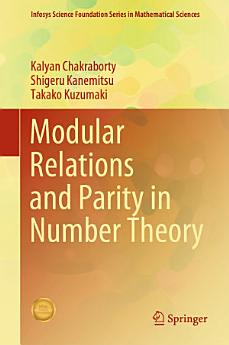Modular Relations and Parity in Number Theory
About this ebook
Many books define zeta functions using Euler products, excluding Epstein and Hurwitz-type zeta functions. Euler products are constructed from objects with a unique factorization domain property. This book focuses on using the functional equation, called the modular relation, specifically the ramified functional equation of the Hecker type. Here, the gamma factor is the product of two gamma functions, leading to the Fourier–Whittaker expansion, and reducing to the Fourier–Bessel expansion or the Chowla–Selberg integral formula for Epstein zeta functions.
About the author
Kalyan Chakraborty is Senior Professor of Mathematics at SRM University AP, Amravati, Andhra Pradesh. Earlier, he was the Director of Kerala School of Mathematics, from 2020–2023; Professor of Mathematics at Harish-Chandra Research Institute (HRI), Allahabad, Uttar Pradesh, India, for over two decades. He obtained his Ph.D. in Mathematics from HRI. He has also been a post-doctoral fellow at the Institute of Mathematical Sciences, Chennai, and Queen’s University, Canada. The broad area of his research lies in algebraic number theory and analytic number theory. In addition, his research areas include class groups of number fields, Diophantine equations, automorphic forms, arithmetic functions, elliptic curves, cryptography and special functions. With more than 80 research articles published in reputed journals, he has published three books on number theory. The Vice-President of the Society for Special Functions & their Applications (SSFA), he has guided more than 10 Ph.D. students and is on the editorial board of some reputed journals.
Shigeru Kanemitsu, a distinguished number theorist, is known for his substantial contributions to analytic number theory. He started his career in analytic number theory and pursued research in approximation of sums of arithmetic functions. In the last 30 years, he has concentrated on the identities connecting two remote-looking objects by the use of the functional equation of the relevant zeta-functions—the subject has culminated in the three-volume book, Contributions to the Theory of Zeta-Functions: Modular Relation Supremacy.
Born in Japan, he has built a reputable academic career through rigorous research and innovative approaches to complex mathematical problems. His work primarily focuses on prime number theory, special functions, and zeta functions, areas in which he has published extensively. His academic journey includes earning his doctorate from a prestigious institution in Japan and holding various academic positions at renowned universities worldwide.
Takako Kuzumaki, a prominent number theorist, is renowned for her influential research in algebraic number theory. Hailing from Japan, she has made significant strides in understanding the deep properties of numbers, particularly in areas related to Diophantine equations, modular forms, and Galois representations. She started her career studying the Milnor K-theory influenced by K. Kato (one joint paper). She collaborated with S. Kanemitsu on various topics in number theory related to algebraic number theory. Meanwhile, she collaborated with Ibukiyam et al. and published a seminal work on lattice zeta-function.
She earned her doctoral degree from a leading Japanese university, where her groundbreaking dissertation laid the foundation for her future research. Throughout her career, she held esteemed positions at various top-tier universities, contributing to academia and the broader mathematical community.






